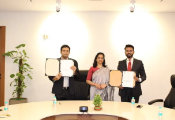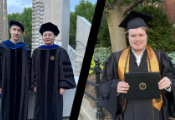“Germany Needs Quantum Advantage” Secretary of State Dr. Franziska Brantner Visits Quantum Startup Kipu Quantum
Karlsruhe, 16 July 2024 –- The Parliamentary State Secretary in the Federal Ministry for Economic Affairs and Climate Action, Dr. Franziska Brantner, visited the world-leading quantum software startup Kipu Quantum. The visit facilitated an intensive exchange on the economic policy framework for quantum computing in Germany.
Daniel Volz, co-founder and CEO of Kipu Quantum, and Enrique Solano, co-founder and Chief Visionary Officer, along with their team, including Benedict Wenzel, David Niehaus, Michael Falkenthal, Sara Schöne and Joanna Folberth highlighted the importance of quantum computing for the economy and explained why the smooth integration of quantum solutions is still years away.
“Our algorithms allow for an up to 1500-fold reduction in the number of required qubits, thus accelerating the realization of some industrial applications on quantum computers by up to ten years,” said Enrique Solano, initiator of the compression algorithms and leader of the innovation team at Kipu. The startup researches and works at the intersection of quantum computing hardware and software.
Dr. Franziska Brantner emphasized the importance of concrete developments in quantum computing for the future competitiveness of Germany and Europe: “Quantum computing is not only a technological revolution but also an enormous opportunity for our industry. I am very pleased that companies from our region, such as Kipu Quantum, are presenting concrete ideas and solutions to make quantum computing applications usable.”
The representatives of Kipu Quantum stressed that current funding instruments are not sufficient to achieve a “ChatGPT momentum” in the field of quantum technology. “Germany needs a bold national strategy coordinated at both the state and federal levels and providing flexible funding. Given geostrategic risks, it is crucial to strengthen quantum-native startups headquartered in Germany,” said Daniel Volz. Furthermore, the promotion of the co-design of hardware and software must be intensified to keep up in the global competition. “To finally achieve quantum advantage and make quantum computers usable, not only non-industrial scientific organizations like the Fraunhofer Society but also startups and large corporations using quantum technology need to be supported in working on specific challenges,” said the CEO of Kipu Quantum.
State Secretary Dr. Franziska Brantner noted with great interest Kipu Quantum’s strategic acquisition of PlanQK. The German platform for quantum applications is the first open, community-based solution that enables smooth collaboration between researchers, quantum application developers, hardware providers, and industrial end-users. PlanQK was initiated in 2019, supported as a flagship project by the German government, and further developed in cooperation with leading universities and research companies. “We must seize the opportunities for Germany and Europe in the field of quantum computing. Cooperation between science and industry is central to this,” said State Secretary Dr. Franziska Brantner.




































